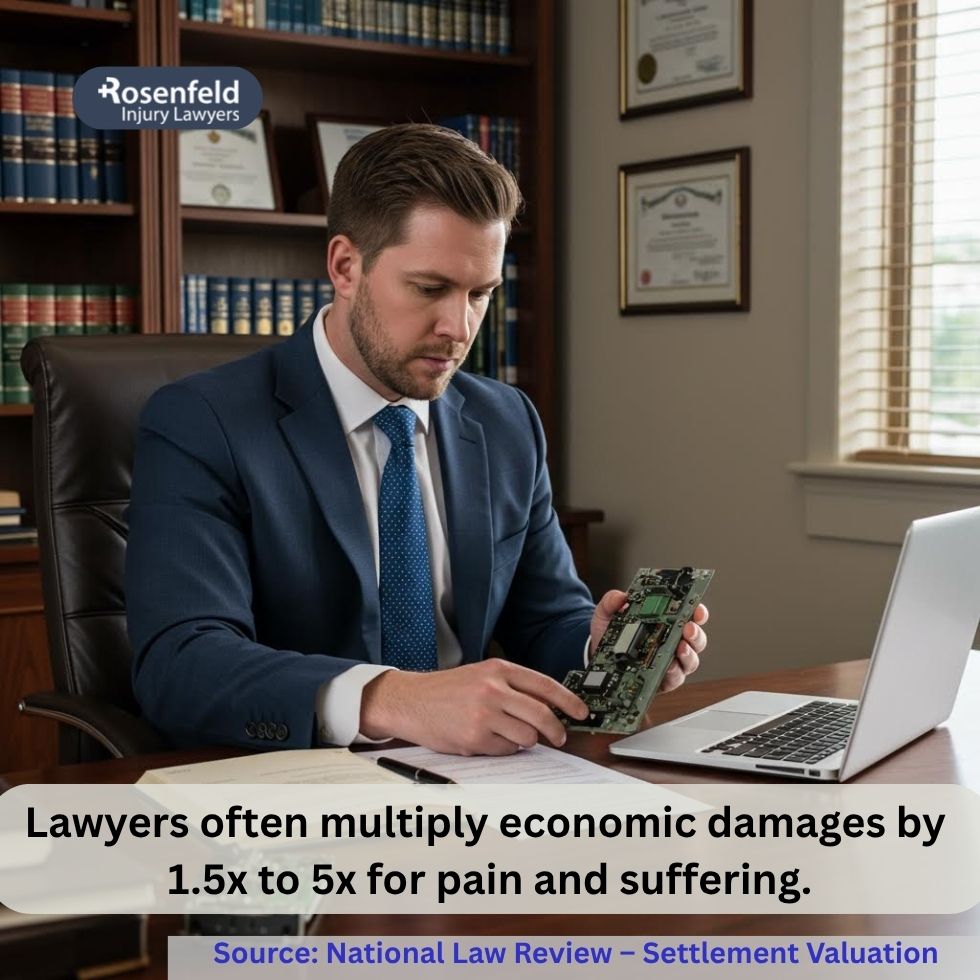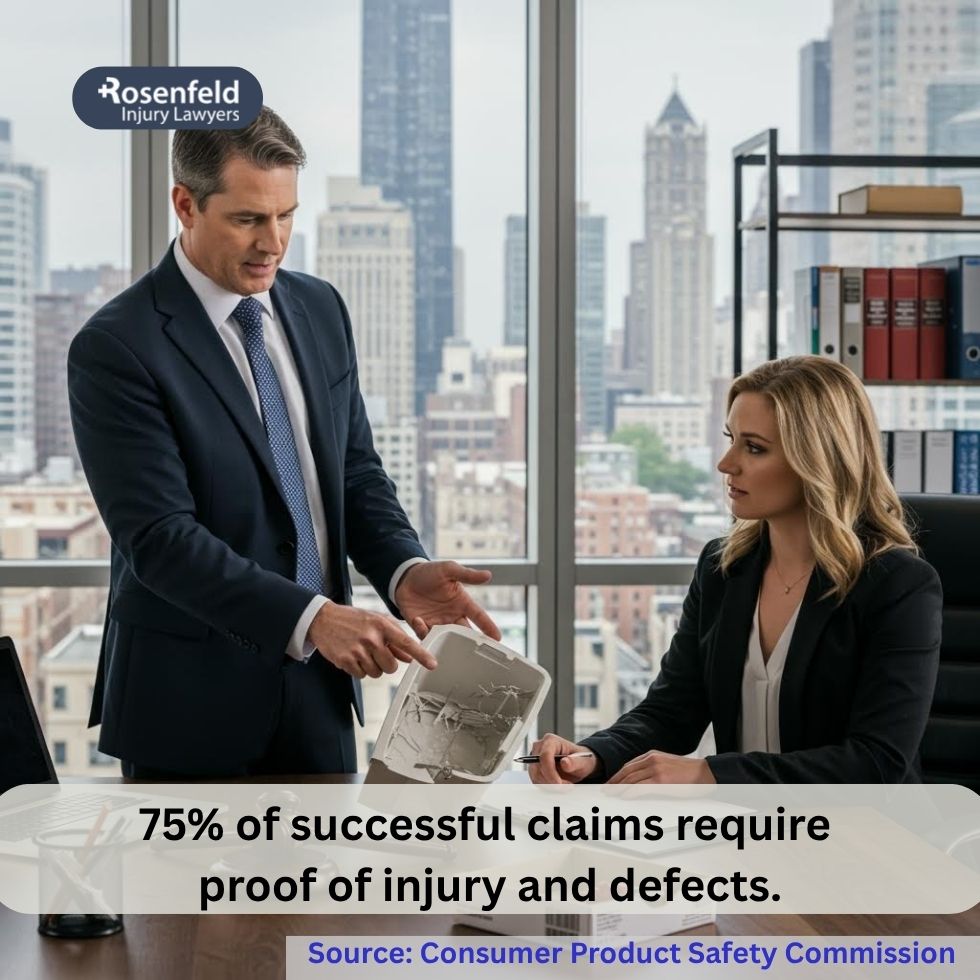- 24/7 Free Consultation: (888) 424-5757 Tap Here To Call Us
What is a Defective Product?

Product defects can arise from a flaw in the design, manufacturing process, or marketing, making the product unreasonably dangerous to consumers. But what is a defective product? A defective product is any item that fails to meet reasonable safety standards and causes harm when used as intended or in a reasonably foreseeable manner.
Three Main Types of Product Defects
In Illinois, product liability law recognizes three distinct ways a product can be considered defective: design, manufacturing, and marketing defects (also known as failure to warn). Proving that a product falls into one of these categories is essential when pursuing a product liability claim after being injured by a defective product.
Type 1: Design Defect Explained
A design defect exists when a product’s intended design is inherently unsafe, making every unit manufactured according to that design unreasonably dangerous. This means the issue isn’t with how the product was built but with the product’s blueprint or concept itself.
For example, an instant noodle cup with a tall, narrow design that becomes unstable when hot water is added—causing it to easily tip over and spill scalding liquid—would be considered defectively designed. These products may be manufactured correctly, but their dangerous nature stems from their core structure, putting consumers at risk even when used as directed.
Type 2: Defect Arising from the Manufacturing Process
A manufacturing defect occurs when a product is designed safely but is damaged, improperly assembled, or altered during the production process, resulting in a specific item or batch becoming hazardous. This type of defect is not present in every unit—only in those affected during manufacture or assembly.
For instance, a household appliance with faulty wiring, a prescription drug or other medical product—such as DermaRite—tainted by contamination, or a vehicle with improperly installed brakes could all pose serious risks due to manufacturing defects. Because the product deviates from its intended design, the manufacturer fails to deliver a safe item and may be held liable if harm occurs.

Type 3: Marketing Defect (Failure to Warn)
A marketing defect, or failure to warn, arises when a product that is otherwise safely designed and manufactured lacks adequate warning labels, instructions, or alerts about non-obvious dangers associated with its use. These cases often involve household chemicals, power tools, or medical devices that should come with clear safety guidance.
If a product manufacturer does not provide sufficient warning about foreseeable risks, such as allergic reactions, operating hazards, or long-term effects, they may be liable for injuries caused by that omission. This type of defect emphasizes the duty to warn consumers and promote safe usage.
Examples of Products with Inadequate Warnings
Products with inadequate warnings are more common than many realize. A power tool sold without clear guidance on protective gear or safe operation can lead to serious injury. Medications that don’t correctly list potential side effects or drug interactions may cause harmful reactions. Children’s toys missing age recommendations or choking hazard warnings can pose fatal risks to young users.
Even common household chemicals without instructions for safe handling, ventilation, or exposure risks can cause burns, respiratory problems, or poisoning. In each case, the failure to warn creates a product liability risk when consumers aren’t informed of the dangers associated with proper or foreseeable use.
When Can a Company Be Held Liable for a Defective Product?
A company can be held liable for a defective product when it places that product into the stream of commerce and someone is injured as a result. This includes not only the product manufacturer, but also distributors, retailers, and others involved in selling or supplying the item.
Whether the harm is caused by a design defect, manufacturing defect, or failure to warn, these parties involved have a legal duty to ensure their products are safe for use. Under strict liability, a victim doesn’t have to prove negligence—only that the defect caused injury while the product was being used as intended.

Legal Theories in Chicago Product Liability Cases
In Illinois, most product liability cases are based on strict liability, which means the injured party doesn’t need to prove the company was negligent—only that the defective product was sold in an unreasonably dangerous condition and directly caused the injury. This simplifies the legal process for those injured by a faulty item.
However, claims can also be based on negligence (if the manufacturer failed to use reasonable care) or breach of warranty (if an express warranty or implied safety promise was broken). An experienced lawyer can determine which legal theory applies based on the facts of your case.
Your Rights if Injured by a Defective Product
If you’ve been injured by a defective product in Chicago, you have the legal right to pursue a product liability claim against the parties responsible—whether that’s the product manufacturer, distributor, or retailer. Victims can seek compensation for medical expenses, lost wages, pain and suffering, and other losses caused by dangerous products.
Whether the injury resulted from a design defect, manufacturing defect, or failure to warn, Illinois law protects consumers and allows them to hold companies accountable. Working with an experienced product liability lawyer can help you understand your rights and pursue the compensation you deserve.
Consult a Chicago Product Liability Attorney Near You

If you believe you’ve been harmed by a defective product, it’s essential to speak with an experienced Chicago product liability lawyer as soon as possible. A knowledgeable attorney can evaluate your situation, determine whether a defect in design, manufacturing, or marketing is involved, and explain your legal options. Don’t wait—companies must be held accountable for dangerous products that cause harm.
Contact our trusted personal injury team today by calling us at (888) 424–5757 or filling out our contact form to protect your rights and pursue the compensation you deserve.
All content undergoes thorough legal review by experienced attorneys, including Jonathan Rosenfeld. With 25 years of experience in personal injury law and over 100 years of combined legal expertise within our team, we ensure that every article is legally accurate, compliant, and reflects current legal standards.







